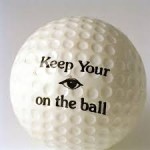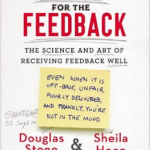 “Keep your eye on the ball and a firm grip on your club” resonates on the fairway on the days that I play golf with my mom. She is a very talented golfer and my game is inconsistent on the best of days. I know that she means well, but I’ll admit that I cringe as I digest her feedback. Fast forward to the local driving range where a friend has agreed to come and watch me break in a new club. Low and behold, he provides the same feedback (almost verbatim) and all of a sudden my reaction is one of gratitude. I immediately put it into practice and voila, that little white ball beautifully sails towards the horizon. Exact same feedback, but my reaction and subsequent implementation varied greatly!
“Keep your eye on the ball and a firm grip on your club” resonates on the fairway on the days that I play golf with my mom. She is a very talented golfer and my game is inconsistent on the best of days. I know that she means well, but I’ll admit that I cringe as I digest her feedback. Fast forward to the local driving range where a friend has agreed to come and watch me break in a new club. Low and behold, he provides the same feedback (almost verbatim) and all of a sudden my reaction is one of gratitude. I immediately put it into practice and voila, that little white ball beautifully sails towards the horizon. Exact same feedback, but my reaction and subsequent implementation varied greatly!
It was on one of those “gotta love this darn game” fairways that I recently had a discussion with a colleague about effective feedback. It wasn’t the usual conversation about how we give feedback, but rather how we accept it. She had attended the Global Leadership Summit sponsored by Willowcreek in August and one of the presenters discussed receiving feedback as his topic.
I started to reflect on this premise on a couple of levels. First my own reaction when receiving feedback. Besides my well-intentioned mom, I receive and actually seek feedback from my supervisors and team members on a regular basis. What factors contribute to my successful implementation of that feedback? Knowledgeable other, respect for the person providing the feedback, shared experience, the way in which the feedback is delivered, the expectation for the implementation, accountability???
When we think about our students and feedback, our most recent practice has been to provide our educators with the tools and strategies to deliver meaningful, timely descriptive feedback. As a profession we are evolving past the “Good Job” and “Gold star” stickers which is creating the conditions for educators to articulate exactly what students need to accomplish in order to move along the learning continuum. The rich dialogue that educators are having both with their students and with each other is having a significant impact on student achievement. Many of our colleagues are also diving head first into the world of pedagogical documentation and using various platforms to document the learning for the purpose of sharing it with colleagues, students and parents as a focal point for discussions about improvement.
So, in the midst of this fantastic feedback frenzy, I can’t help but wonder if we have spent enough (or any) time preparing students on how best to receive feedback. What will it take to ensure that they don’t tune us out?
The other layer of this inquiry is how do we continue to have rich learning dialogues with colleagues knowing the importance of not only providing feedback but receiving it. We are passionate about our practice and take it personally when others comment on what we are doing and how we are doing it. How can we open our ears and hear what others are sharing without becoming defensive?
 Just today, I had a conversation with a colleague in passing and I started to share my new thinking on the topic of feedback. Within minutes, she highly recommended “Thanks for the Feedback” written by Douglas Stone and Sheila Heen. Looks like I’ve just acquired one more book to add to my list of “must reads”!
Just today, I had a conversation with a colleague in passing and I started to share my new thinking on the topic of feedback. Within minutes, she highly recommended “Thanks for the Feedback” written by Douglas Stone and Sheila Heen. Looks like I’ve just acquired one more book to add to my list of “must reads”!
What factors affect how you receive feedback? How can we better prepare both ourselves and our students to effectively receive feedback?
Come write with me…..
